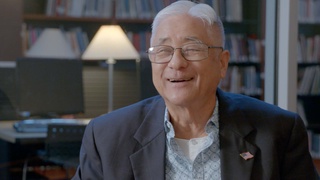Interviews
Results of being more American than Japanese
I think, one of the disadvantages of trying to become so American was that—in my case—it created a chasm between, let’s say, me and my mother. I wanted her very much to learn English, but she was so busy taking care of us and helping to work and it was hard for her to take any time to learn English. She did the best… she was so dear.
She would come to the PTA [Parent Teacher Association] meetings not knowing what was going on at all, but just to show up because I said [to her], “The more parents who come to these PTA meetings, our homeroom will get a prize, some kind of honor.” So even though she had no knowledge [of English and] or did not understand what was going on, she would dress up, put on a hat and come to the PTA meetings. I didn’t try hard enough to learn Japanese in order to be closer to her. That’s the biggest regret of my life.
Date: August 26, 1998
Location: Virginia, US
Interviewer: Darcie Iki, Mitchell Maki
Contributed by: Watase Media Arts Center, Japanese American National Museum
Explore More Videos

My daughter couldn’t fit in Japan, so I decided to go back to America (Japanese)
(b. 1936) Shin-issei welding business owner

Unique Identity from Having Multiple Backgrounds
(b. 1938) Philipines-born hikiagesha who later migrated to the United States.

Growing up Japanese in Hawaii
(b. 1952) Former banking executive, born in Hawaii



Parents identification as Peruvian Okinawan
Okinawan American whose parents are from Peru.

Okinawan cultural appreciation
Okinawan American whose parents are from Peru.

Prejudice against Okinawans from mainland folks
Okinawan American whose parents are from Peru.

American values she aligns with
Okinawan American whose parents are from Peru.

Working together in Okinawa using three languages
Okinawan American whose parents are from Peru.

Mother founded Japanese language school in neighbors’ backyard
Sansei judge for the Superior Court of Los Angeles County in California

Expressing herself through poetry
(b. 1923) Japanese American poet, activist

Her brother’s reasons as a No-No Boy
(b. 1923) Japanese American poet, activist

Her grandfather was pressured to teach Japanese
Sansei judge on the Superior Court of Los Angeles County in California

About Escobar (Spanish)
(b. 1962) Nisei Japanese Argentinian, currently residing in Japan
